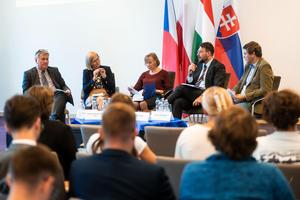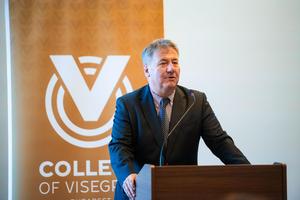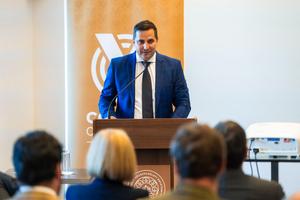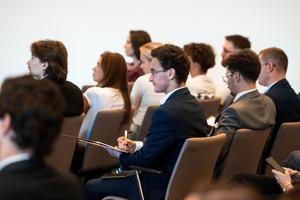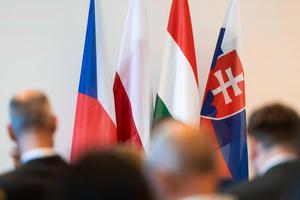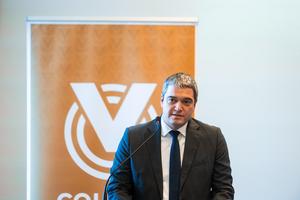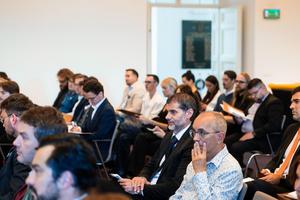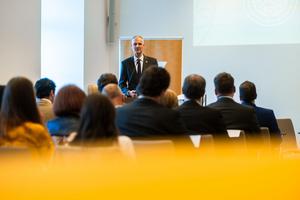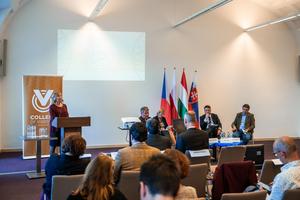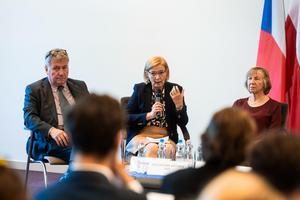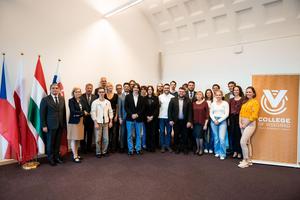On October 8, the John Lukacs Institute (JLI) of the Eötvös József Research Centre (EJKK) at Ludovika University of Public Service (LUPS) held the opening conference of the 4th College of Visegrad+ Weekend University program in the university’s Zrínyi Miklós Hall. The College of Visegrad+ initiative aims to strengthen dialogue and cooperation among young people from the four Visegrad countries (Hungary, Poland, Czechia, Slovakia) in the spirit of historical traditions and European unity. As is well known, the history of the Visegrad Cooperation dates back to 1335, when Charles Robert, King of Hungary, invited the King of Czechia and the ruler of Poland to the Visegrad Palace. Centuries later, in 1991, the Visegrad Declaration was signed, and in 2004, the four countries simultaneously joined the European Union. According to the organizers, the current program, held from October 8–12, emphasizes that Visegrad Cooperation remains as important today as it did nearly 690 years ago, as it strengthens joint advocacy and regional cohesion among EU member states.
At the opening, Gergely Prőhle, Program Director of the John Lukacs Institute, emphasized that the events of the College of Visegrad+ Weekend University are always valuable because they nurture future cooperation by connecting shared historical experiences with the younger generations. He noted that in the past, the four countries were united by common historical experiences and anti-communist traditions, as well as the goal of EU accession. He highlighted that the current task is to preserve traditions while ensuring sustainability and European competitiveness. “The topic of the 4th College of Visegrad+ Weekend University reflects this focus: ‘Sustainability and European Competitiveness’, aimed at fostering cooperation along common European interests,” Prőhle Gergely stated.
Gergely Deli, Rector of LUPS, welcomed the participants and guests, emphasizing the tradition of Central European cooperation, the responsibility of young people for the region’s future, and the program’s role in strengthening European competitiveness and sustainability. He highlighted the spirit of the original cooperation among the four Central European V4 countries, which continues to unite the region today. “The program has now grown into an important regional dialogue platform,” said the Rector, adding that the event provides an international forum for future young leaders and researchers to freely exchange ideas, jointly shape the political and economic future of the region, and gain deeper insights into the economic, social, and political issues influencing regional development. He also noted that student participation demonstrates their commitment to social responsibility and public service.
Bálint Czékus, head of the Central Europe Department at the Hungarian Ministry of Foreign Affairs and Trade, spoke about the historical significance, challenges, and future of Central European cooperation, as well as the priorities of Hungary’s current V4 presidency. He emphasized that educational initiatives like this help preserve the essence and spirit of V4 cooperation. Czékus stressed that Hungarian foreign policy is based on realistic assessments, and while regional cooperation cannot solve everything, it has tangible economic and demographic weight: the four countries together represent about 65 million people, comparable to the population of France. Visegrad Cooperation is key to Central European stability and development, and dialogue among youth helps maintain the V4 spirit. The region represents significant economic potential, and the V4 remains one of the EU’s most successful models of regional cooperation.
Márton Ugrósdy, Deputy State Secretary at the Prime Minister’s Cabinet Office, in his lecture titled “The Importance of Central European Cooperation from the Perspective of Hungarian National Strategy”, outlined the historical foundations, current significance, and strategic role of Central European cooperation. He argued that what makes the Central European countries special is that, “squeezed between two great powers, Germany and Russia,” they have always had to ensure their survival through their own, often creative, solutions. He noted that this flexible thinking still shapes the region’s political culture. Ugrósdy emphasized that the region’s infrastructure remains oriented along east–west axes, established during the Soviet occupation, making connectivity improvement across transport, energy, and economic sectors one of the most important shared tasks. He stressed that the region’s strength lies in collective thinking and self-organizing capacity, and encouraged participants to maintain contact with each other, as they will be the decision-makers shaping the region’s future.
The subsequent roundtable discussion focused on “Key Challenges to EU and V4 Regional Competitiveness”, featuring V4 participants: Dagmar Vránová, digital economy and competitiveness expert from the Czech Ministry of Industry and Trade; Edit Szilágyiné Bátorfi, Hungarian Ambassador to Austria and former Executive Director of the International Visegrad Fund; Piotr Arak, chief economist at Poland’s VeloBank and co-founder of the Polish Economic Institute; and Marcel Dolobáč, Deputy Dean of the Faculty of Law at Slovakia’s Pavol Jozef Šafárik University.
Dagmar Vránová stressed that competitiveness and sustainability are central issues for both the EU and the V4 countries. She noted that the region shares strong industrial output, automotive dependence, and significant innovation potential, making this duality—dependence and opportunity—both a challenge and an opportunity for the V4. From an Austrian perspective, Szilágyiné Bátorfi emphasized that Central Europe’s competitiveness within the EU is especially important because the region’s economic strength and dynamism play an increasingly prominent role in the EU’s development. She noted that competitiveness should be interpreted broadly, encompassing economic, social, educational, and innovation dimensions. Piotr Arak added that the essence of competitiveness lies in action, particularly in industrial policy, service development, energy security, and defense. He suggested focusing on the single internal market, defense and military-industrial development as a practical strategy. Marcel Dolobáč highlighted the serious issue of skilled labor emigration, noting that nearly 80% of students continue their studies abroad, making the integration of education and innovation crucial for competitiveness. He also argued that the EU’s excessive regulation hinders innovation, while the USA responds faster to market processes. As a summary, participants agreed that the main challenges for the V4 and the EU include automotive sector restructuring, energy independence, more effective integration of innovation and research, digitalization and AI development, retention of skilled labor, and tackling excessive EU bureaucracy.
After the opening conference, participants of the 4th College of Visegrad+ program traveled to Visegrad to further explore and discuss the topic of competitiveness, crucial for both the V4 countries and the entire EU, from multiple perspectives.
Text: Éva Harangozó
Photo: Dénes Szilágyi
